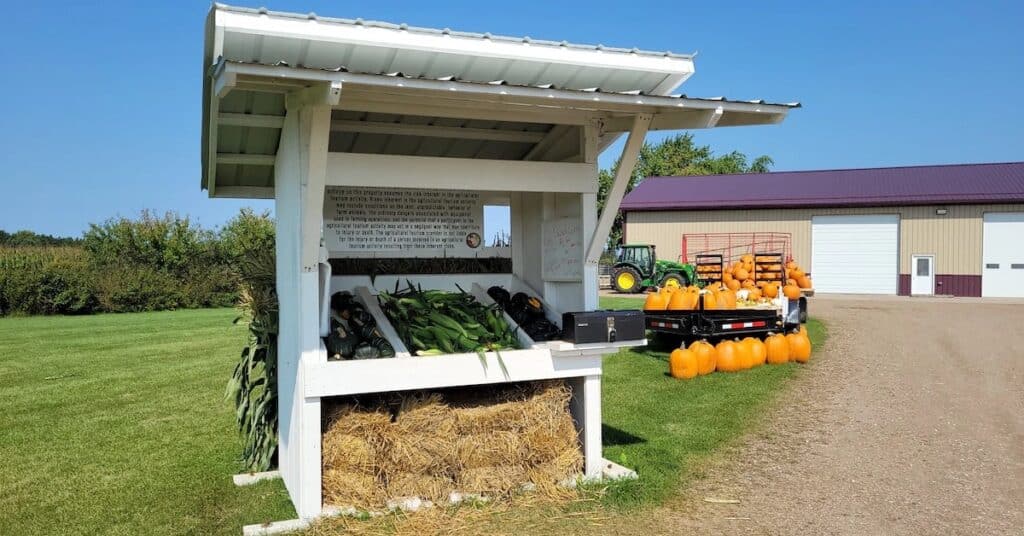The USDA calls them direct-to-consumer (DTC) outlets. Sounds pretty fancy for what might be as simple as a card table or old hay wagon piled with homegrown produce. You’ll find DTC sales on well-traveled country roads and way, way off the beaten path. Whether you’re shopping for pumpkins or pickles, sweet corn, local honey, or farm-fresh eggs, roadside stands are the place to make sure your dollars go directly to local producers.

But even at no-frills roadside stands, shopping etiquette can be different from what you’re used to at supermarkets and even farmers markets. I learned that from my grandmother. My dad’s parents sold homegrown vegetables and fruits from a three-sided shed on skids that my grandpa would drag up to their circle driveway every summer. Folks from South Bend, Indiana, came out to buy their sweet corn, tomatoes, cucumbers, and more. That’s where I learned to weigh out green beans, count back change, and look customers in the eye.
A lot has changed since then. Still, you can’t go wrong with cash, cartons, and courtesy when buying at roadside stands, whether you’re a foodie from the big city or live just up the road.
Cash works. There may be vendors at the farmers market you can pay with Venmo or who will swipe your credit card and run the purchase through Square. There may even be roadside sellers able to accept plastic or mobile payments. That’s probably more likely if they sell higher-priced products, or if their clientele thinks paying for artisanal microgreens should be just like picking up Starbucks. But where WiFi doesn’t reach the end of the driveway and cell signals are unreliable, cash is the standard. If you don’t generally carry cash, get some to stash in your vehicle – preferably in small bills. Don’t expect the folks at a roadside stand to make change for that fifty dollar bill when all you’re buying is a melon. And when those juicy homegrown strawberries are sitting next to home-baked shortcake, you don’t want to be short on small bills.
Honor system. It’s hard to hoe vegetables or put up pickles to sell if you’re sitting by the road waiting for potential customers. So there may not be anyone manning that roadside stand to make change for you. Instead, many sellers operate on the honor system. Take a moment to look past the produce for signs clues about how it works at a particular location, such as sign boards with prices. Some places let you make your own change. Others might use a locking drop box with a cash slot. If you don’t have the correct change, add a squash or two to round up to the bill you can’t break. Some places are fine with regular customers leaving an IOU and making up what they’re short on their next visit. But if you’re just passing through, err on the side of overpaying – even if there’s no game camera aimed at the stand. The kind of faith in people that underpins the honor system is priceless.
Plan ahead. Some items are too much temptation for those who didn’t learn to be honorable and too great a loss for producers to risk. Sometimes you can reach out via social media to place an order, pay online, and have that case of maple syrup you want to buy for holiday gifts waiting for a porch pickup. If you arrange an in-person pickup time, be on time yourself but try to be understanding about disruptions and delays the farmer might experience. Whatever crazy story they tell about what made them late is probably just the half of it.
Parking. Not everyone has a nice big circle drive like my grandparents did, and many roadside stands succeed despite poor visibility and limited access. But life is better for growers and other customers when everyone makes thoughtful choices about where and how they park. For example, don’t block a rural mail carrier’s access to the mailbox, or block the sight lines for others pulling in or out. Some places address visibility and safety concerns by setting up a one-way traffic flow, with designated entrance and exit drives. Look for other signs like “Park Here” and “No Parking”. There are exceptions to the rules about courteous parking but they generally apply only to elderly or mobility-impaired neighbors asked to pull up closer for the owner’s peace of mind.
Boxes, baskets, buckets, and bags. My grandparents sold fruit and vegetables in reusable wood stave and splint bushel and peck baskets. Nowadays, a stand may have a stack of recycled cardboard boxes and trays from cases of soft drinks. But don’t count on it unless they have a U-pick operation that requires containers with a known tare weight. That bucket is not included in the price for those canning tomatoes or pickling cukes. So bring your own buckets, boxes, baskets or bags. If you’re buying bedding plants or perennials, take back the plastic containers from last year’s purchases. If you’re picking up eggs, drop off your empty cartons.
No switcheroos. It’s okay to look for the perfect jack-o-lantern pumpkin or the biggest head of cabbage. But it’s not okay to remix bags or boxes. Whether it’s a few slicers or a bucket of produce for canning, leave items sold by weight or volume as they are. It might seem harmless to just switch that tomato with green shoulders for a perfectly red one from another container but don’t. Even with green shoulders, it will have more flavor than those evenly-colored red things sold in supermarkets.
About perfection… At roadside stands, you will find perfect specimens and also blemished produce. Sadly, some people have had such limited exposure to real food they don’t know you can just cut out a bad spot. You can, and probably will need to do so in a few items sold in large lots for canning. So buy a bit more than you think you need, just in case. And for sweet corn? You may peek under the husk of one (1) representative ear to see if it meets your expectations. If not, stop there – don’t shuck and reject half a dozen ears in the pursuit of perfection and leave the rejects.
‘Tis the season. Transportability and keeping qualities outweigh flavor in most supermarket produce sections. Roadside stands, on the other hand, give you an opportunity to buy varieties that don’t travel or store well but make up for it in flavor. That yellow watermelon might split if you drop it on the counter but it’s worth the risk for the sweet juice that drips from your chin as you spit the seeds (that’s right – real watermelons have seeds). At roadside stands the choices will change more dramatically from week to week than at a supermarket. Some roadside stand owners use succession planting or choose varieties that mature at different times to stretch the season. But enjoy things while you can at their peak of freshness and flavor. When it’s gone, it’s gone – although you might be able to buy the pickled version to tide you over until next season.
Pickles and pH. Cottage food laws vary from state to state. In Wisconsin, for example, it’s legal to sell jams, jellies, pickles, sauces, and other foods that are naturally acidic or acidified by pickling or fermentation, even if they’re produced in a home kitchen instead of a commercial facility. It’s not legal, though, to sell low-acid home-canned foods. So while you may find pickled Dilly Beans for sale at a roadside stand, if you want jars of green beans like your grandma used to make you’ll need to can them yourself. Cottage food laws also cover (if imperfectly) sales of other items deemed safe enough to be produced in a home kitchen. In Wisconsin, roadside stands can sell home-baked goods that don’t require refrigeration, don’t contain things like cream or custard fillings, and are not so moist they could spoil quickly if unrefrigerated. So instead of selling zucchini bread, a roadside stand may offer a great recipe and a great deal on monster zucchini.
Boundaries. Some pumpkin patches and Christmas tree farms may be set up to accommodate visitors planning to spend the afternoon, but a roadside stand is not an open invitation to wander all over someone’s property. There are inherent risks associated with areas where farm animals and equipment may be present and with parents of toddlers who just went down for a nap. The house is off limits, as is knocking on the door unless a sign at the stand specifically invites you to do so. Farm buildings, pastures, and pens are also off-limits. A visitor who doesn’t know better can inadvertently spread pathogens like avian influenza, which can wipe out a backyard flock. By all means, enjoy taking your kids to pet the pony if the farmer invites you to do so. Otherwise, stay near the stand and admire from a distance.
Getting help. Some stand owners post a cell number to call for assistance. Or there might be an old-school doorbell or buzzer you can press to signal the seller your request for assistance. If a WiFi signal can reach far enough, a roadside stand might even have one of those door cameras that lets you talk to someone without waiting for them to hustle out to the stand. But for in-person help, be prepared for a bit of a wait. It takes a while to reach the road from the Back 40, or if the grower just took off muddy boots to go to the bathroom. And don’t buzz or call just to haggle on price: You don’t do that at a supermarket so don’t expect it to go over well with the person who sowed, hoed, watered, weeded, and chased off raccoons.
Speaking of bathrooms… If a roadside stand pays well enough to rent a porta-potty for the season, use that. But don’t ask to use the bathroom in the family’s home. A friend told me about her experience with customers making this request. Ewwww. Even nice people who let folks pay on the honor system or leave an IOU under a rock have their limits.
Donna Kallner writes from rural northern Wisconsin, where she just finished canning five gallons of cider she bought locally. She took her own bucket to fill. This article first appeared on The Daily Yonder and is republished here under a Creative Commons license.


